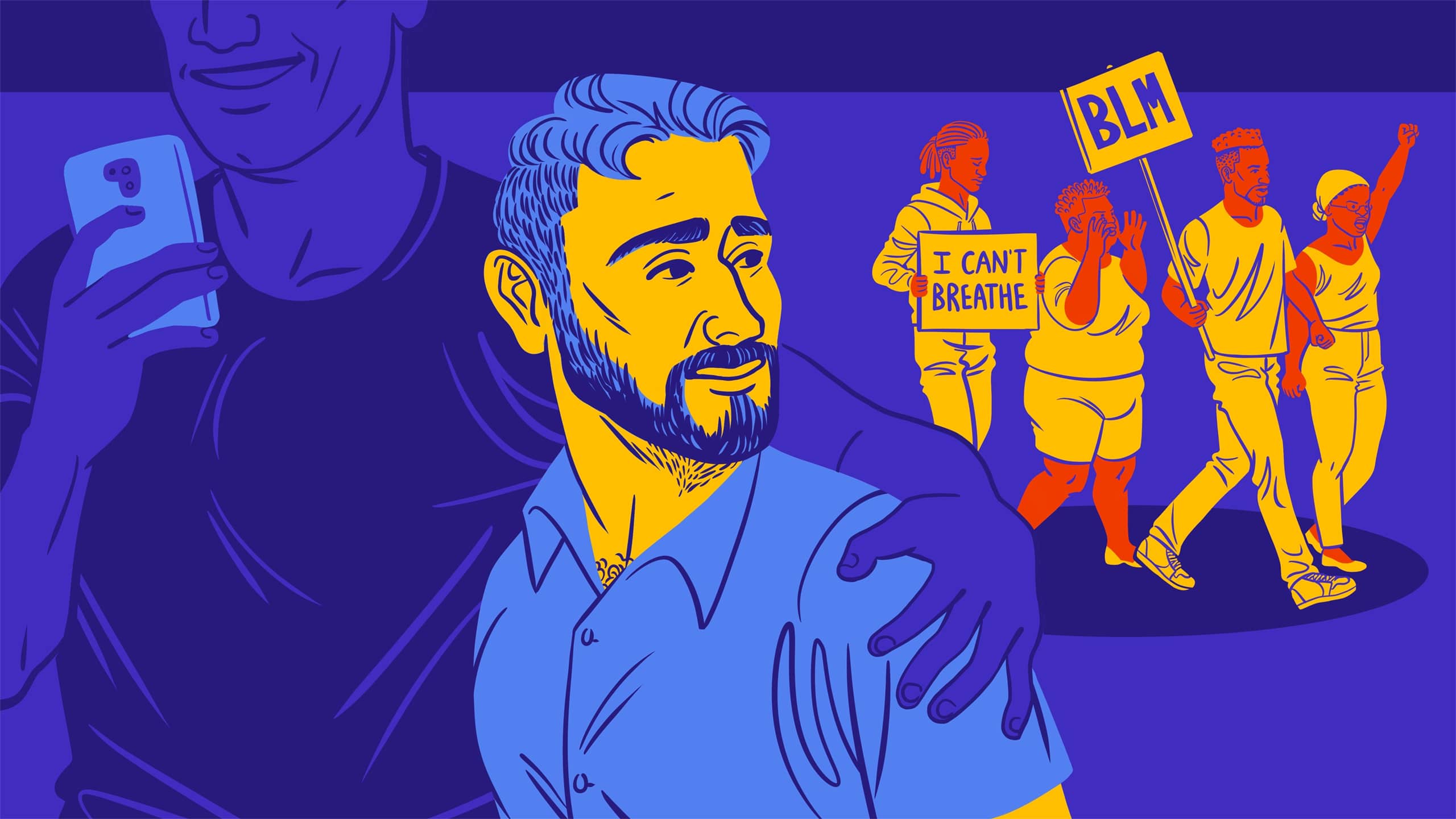Years from now, I wonder if we’ll remember how 2020 humbled us. In a year of uncertainty, when going out to meet new people wasn’t an option, singles passed the time by reconnecting with their exes and hitting dating apps; I’d say many of us have been humbled.
Chris is the mid-20 year old who always has to establish himself as the “funny one” in any social setting. We dated for a few months last year and I could so clearly see this need to get a few laughs at any cost. It reminded me of the humour that we, as gay men, used to survive in our youth, with the idea being that so long as we cracked a joke, we wouldn’t be bullied.
Black women are often on the receiving end of his “jokes.” He refers to one of his best friends as “Brownie.” He would speak in vague Asian accents when we went for sushi. As a child of Middle Eastern immigrants, it was impossible for me to just sit there and laugh it off.
On paper, it seemed like a no-brainer to stop talking to the man—except that we had that kind of chemistry that’s impossible to rationalize to your friends when they tell you, again and again, to not even bother with him. It’s that chemistry that crossed my mind in March when his name popped up on my Instagram.
The circumstances couldn’t have fit any better. The world was at a standstill, everyone was lonely and horny at home quarantining, and he had just become newly single. That initial cautious conversation stretched out over months. I was reminded that as convenient (and accurate) as it would be to brush him off as some bigot, he’s far from stupid and one of the hardest working people I know. Eventually, talking once every few days became every day. We played Mario Bros sitting on the carpet in my living room, and I took a train out of the city so he could barbeque for us in his backyard.
We tiptoed around any conversations on issues he considered “sensitive” because what we had was “casual”—we didn’t need to talk about Very Important Topics. I also knew that it would force me to remember that he and I have fundamental disagreements—not exactly what you want to be thinking about when you’re “keeping things casual.”
But suddenly, it was unavoidable. George Floyd. Ahmaud Arbery. Breonna Taylor. Regis Korchinski-Paquet. A seemingly unending list of names. The murders of countless Black people sparked a national reckoning in both the United States and in Canada; white or not, ignoring the reality of systemic anti-Blackness was no longer an option.
On June 2, my Instagram feed was a mass of indistinguishable black squares for #BlackOutTuesday. One square had stood out, and it belonged to a man who used to laugh at me every time I explained why it was unacceptable for him to rap the N-word in a Nicki Minaj verse.
Perhaps sensing that now was not the time to be “funny,” Chris had not said anything about the protests; I brought this up when I messaged him, asking why he had posted.
“Don’t attack me for doing a nice thing.”
You could say a lot about Chris, but up until that response, you couldn’t call him fake. Never mind his jokes, the two seconds it took to post was his grand, praise-worthy contribution to the fight for racial justice.
To anyone else, it would have been another black square among many, but I know that Chris has never cared about people of colour; racism was nothing more than means to a punchline. It would have been better if he hadn’t posted at all, because this felt like a complete mockery of a very real, very necessary movement.
Although insincere, his black square forced me to reckon with the fact that I had continued to enable his racism. It was unavoidable, glaring back at me from my phone screen. For every comment he made, as furious as it made me and as hurt as I was, I always seemed to let it go. I might have even convinced myself that I was the one overreacting; at some point, I figured, being with an Arab man would suddenly make him realize the error of his ways.
How could he have been racist when there he was, lying in my bed and hogging the sheets?
Being an ally means having difficult conversations, but it can also mean leaving conversations. My conversation with Chris ended that afternoon. It didn’t matter that only a few days before we had talked about getting close again. I told him that, at some point, maybe we could give it another shot—after all, we knew each other a lot better than we did a year ago.
“How could he have been racist when there he was, lying in my bed and hogging the sheets?”
But the black square on his feed was just another joke. As the rest of us protested, he was “doing a nice thing.” You can have all the chemistry in the world, but none of it matters if you’re repulsed by his actions.
Gay people are masters of impression management, deliberately adjusting facets of ourselves and our social media to appeal to others. It’s so easy to be an ally when being an ally is a good look. I can’t call myself an ally and take action against anti-Blackness while willingly choosing to talk to someone like Chris. I would be just as fake if I had continued talking to him while protesting and posting.
In the past, I would tell myself I was done talking to him, but inevitably we’d end up going back and forth once again. When we broke up the first time, it felt like it never ended because we still talked every day. It’s been months since that final afternoon, and that urge to message him has long vanished.
I really don’t know if someone is going to be able to make him understand the severity of what he says, mostly because he doesn’t care to understand. It’s not our job to educate.
Humbling as it was to be in the same place I was the year before, I take pride in making different choices this time. We place a lot of self-worth on whether or not we’re in relationships, but the past year has forced us to get comfortable with ourselves and uncomfortable with the status quo. Single or not, I’d rather focus my energy on real, lasting, change.


 Why you can trust Xtra
Why you can trust Xtra


